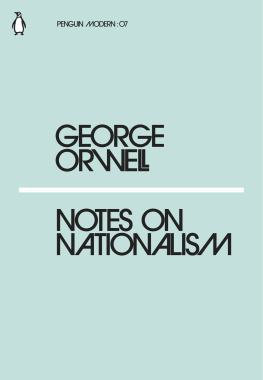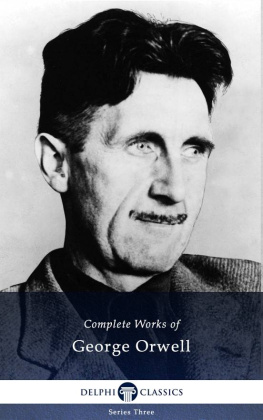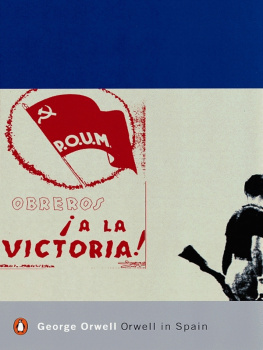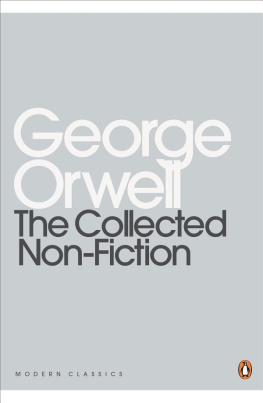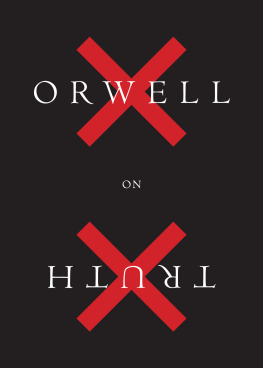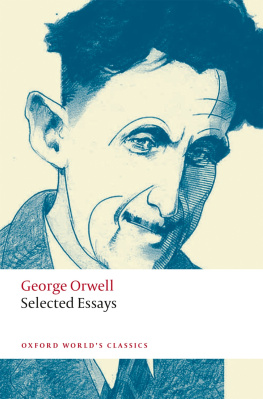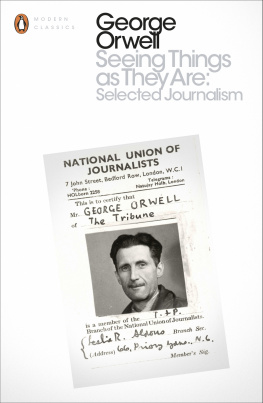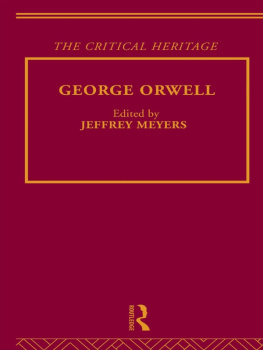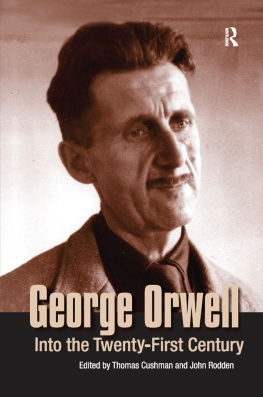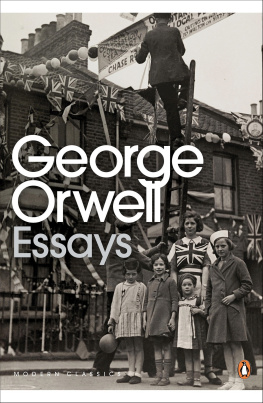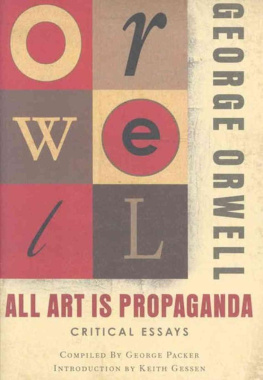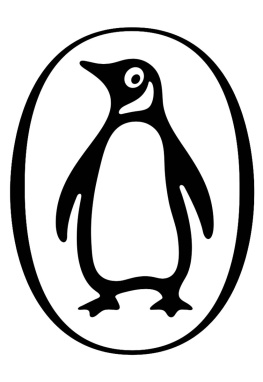GEORGE ORWELL
Born 1903, Bihar, India
Died 1950, London, England
These essays were all written in 1945. Notes on Nationalism was first published in Polemic; Antisemitism in Britain in Contemporary Jewish Record; and The Sporting Spirit in Tribune. They are available in Orwells Essays.
ORWELL IN PENGUIN MODERN CLASSICS
A Clergymans Daughter
A Life in Letters
Animal Farm
Burmese Days
Coming Up for Air
The Complete Novels
Down and Out in Paris and London
Essays
Homage to Catalonia
Keep the Aspidistra Flying
The Lion and the Unicorn
Nineteen Eighty-Four
The Orwell Diaries
Orwell and Politics
Orwell and the Dispossessed
Orwell in Spain
Orwells England
The Road to Wigan Pier
Shooting an Elephant
- MARTIN LUTHER KING, JR. Letter from Birmingham Jail
- ALLEN GINSBERG Television Was a Baby Crawling Toward That Deathchamber
- DAPHNE DU MAURIER The Breakthrough
- DOROTHY PARKER The Custard Heart
- Three Japanese Short Stories
- ANAS NIN The Veiled Woman
- GEORGE ORWELL Notes on Nationalism
- GERTRUDE STEIN Food
- STANISLAW LEM The Three Electroknights
- PATRICK KAVANAGH The Great Hunger
- DANILO KI The Legend of the Sleepers
- RALPH ELLISON The Black Ball
- JEAN RHYS Till September Petronella
- FRANZ KAFKA Investigations of a Dog
- CLARICE LISPECTOR Daydream and Drunkenness of a Young Lady
- RYSZARD KAPUCISKI An Advertisement for Toothpaste
- ALBERT CAMUS Create Dangerously
- JOHN STEINBECK The Vigilante
- FERNANDO PESSOA I Have More Souls Than One
- SHIRLEY JACKSON The Missing Girl
- Four Russian Short Stories
- ITALO CALVINO The Distance of the Moon
- AUDRE LORDE The Masters Tools Will Never Dismantle the Masters House
- LEONORA CARRINGTON The Skeletons Holiday
- WILLIAM S. BURROUGHS The Finger
- SAMUEL BECKETT The End
- KATHY ACKER New York City in 1979
- CHINUA ACHEBE Africas Tarnished Name
- SUSAN SONTAG Notes on Camp
- JOHN BERGER The Red Tenda of Bologna
- FRANOISE SAGAN The Gigolo
- CYPRIAN EKWENSI Glittering City
- JACK KEROUAC Piers of the Homeless Night
- HANS FALLADA Why Do You Wear a Cheap Watch?
- TRUMAN CAPOTE The Duke in His Domain
- SAUL BELLOW Leaving the Yellow House
- KATHERINE ANNE PORTER The Cracked Looking-Glass
- JAMES BALDWIN Dark Days
- GEORGES SIMENON Letter to My Mother
- WILLIAM CARLOS WILLIAMS Death the Barber
- BETTY FRIEDAN The Problem that Has No Name
- FEDERICO GARCA LORCA The Dialogue of Two Snails
- YUKO TSUSHIMA Of Dogs and Walls
- JAVIER MARAS Madame du Deffand and the Idiots
- CARSON MCCULLERS The Haunted Boy
- JORGE LUIS BORGES The Garden of Forking Paths
- ANDY WARHOL Fame
- PRIMO LEVI The Survivor
- VLADIMIR NABOKOV Lance
- WENDELL BERRY Why I Am Not Going to Buy a Computer
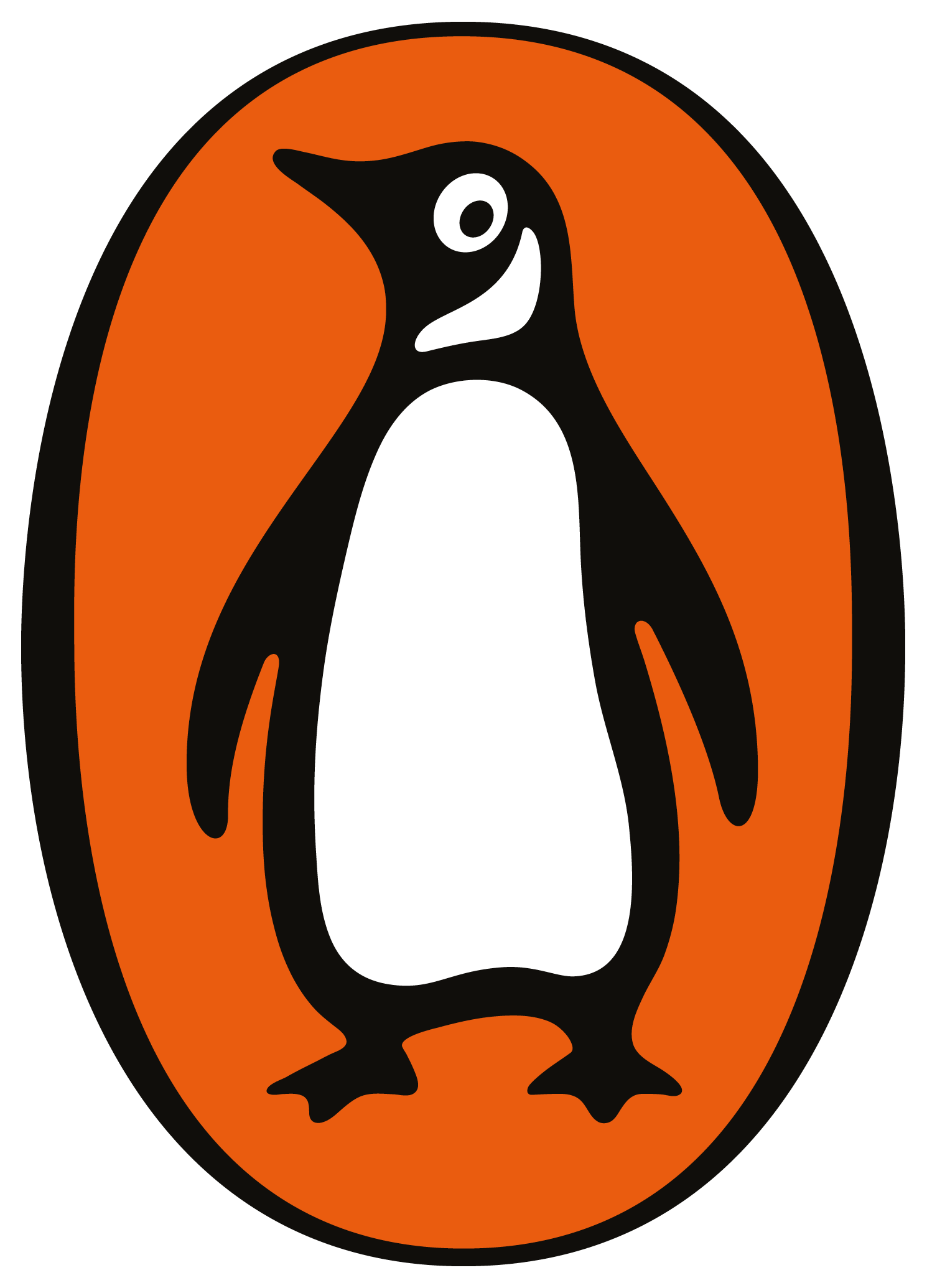

Notes on Nationalism
Somewhere or other Byron makes use of the French word longueur, and remarks in passing that though in England we happen not to have the word, we have the thing in considerable profusion. In the same way, there is a habit of mind which is now so widespread that it affects our thinking on nearly every subject, but which has not yet been given a name. As the nearest existing equivalent I have chosen the word nationalism, but it will be seen in a moment that I am not using it in quite the ordinary sense, if only because the emotion I am speaking about does not always attach itself to what is called a nation that is, a single race or a geographical area. It can attach itself to a church or a class, or it may work in a merely negative sense, against something or other and without the need for any positive object of loyalty.
By nationalism I mean first of all the habit of assuming that human beings can be classified like insects and that whole blocks of millions or tens of millions of people can be confidently labelled good or bad.more important I mean the habit of identifying oneself with a single nation or other unit, placing it beyond good and evil and recognizing no other duty than that of advancing its interests. Nationalism is not to be confused with patriotism. Both words are normally used in so vague a way that any definition is liable to be challenged, but one must draw a distinction between them, since two different and even opposing ideas are involved. By patriotism I mean devotion to a particular place and a particular way of life, which one believes to be the best in the world but has no wish to force upon other people. Patriotism is of its nature defensive, both militarily and culturally. Nationalism, on the other hand, is inseparable from the desire for power. The abiding purpose of every nationalist is to secure more power and more prestige, not for himself but for the nation or other unit in which he has chosen to sink his own individuality.
So long as it is applied merely to the more notorious and identifiable nationalist movements in Germany, Japan and other countries, all this is obvious enough. Confronted with a phenomenon like Nazism, which we can observe from the outside, nearly all of us would say much the same things about it. But here I must repeat what I said above, that I am only using the word nationalism for lack of a better. Nationalism, in the extended sense in which I am using the word, includes such movements and tendencies as Communism, political Catholicism, Zionism, Antisemitism, Trotskyism and Pacifism. It does not necessarily mean loyalty to a government or a country, still less to ones own country, and it is not even strictly necessary that the units in which it deals should actually exist. To name a few obvious examples, Jewry, Islam, Christendom, the Proletariat and the White Race are all of them the objects of passionate nationalistic feeling: but their existence can be seriously questioned, and there is no definition of any one of them that would be universally accepted.
It is also worth emphasizing once again that nationalist feeling can be purely negative. There are, for example, Trotskyists who have become simply the enemies of the USSR without developing a corresponding loyalty to any other unit. When one grasps the implications of this, the nature of what I mean by nationalism becomes a good deal clearer. A nationalist is one who thinks solely, or mainly, in terms of competitive prestige. He may be a positive or a negative nationalist that is, he may use his mental energy either in boosting or in denigrating but at any rate his thoughts always turn on victories, defeats, triumphs, and humiliations. He sees history, especially contemporary history, as the endless rise and decline of great power units, and every event that happens seems to him a demonstration that his own side is on the up-grade and some hated rival on the down-grade. But finally, it is important not to confuse nationalism with mere worship of success. The nationalist does not go on the principle of simply ganging up with the strongest side. On the contrary, having picked his side, he persuades himself that it

